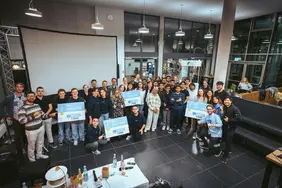The aim of the competition was to develop innovative solutions for local public transport in the Ingolstadt region. Topics included the optimisation of booking processes for group excursions and the use of on-demand data to improve services in rural regions.
The jury, consisting of representatives from the VGI as well as experts from the Technical University and AININ, was impressed by the variety and quality of the projects. Due to the close decision, a third place was awarded at short notice. ‘The students‘ innovative approaches are a great benefit for the region and the further development of sustainable mobility,’ emphasised Christian Anghelide, Innovation and Network Manager at AININ.
First place and therefore 5,000 euros went to the ‘DefinitelyMaybe’ team. The students impressed the jury with a fully functional dashboard that visualises the booking, usage, and cancellation data of the VGI-Flexi on-call buses. They also integrated an AI-supported forecasting tool that can predict future bookings. This solution is not only innovative but also immediately practical.
The ‘Fantastic Four’ team took second place and received 3,000 euros. They developed an intelligent booking tool for VGI-Flexi that uses artificial intelligence to determine the potential cancellation rate of bookings and make it visible to users.
Third place went to two teams, who each received 2,000 euros in prize money. The ‘Gummibärenbande’ team was impressed with a technically sophisticated booking platform that enables schools and public institutions to easily organise bus excursions. The ‘Design Mobility’ team showed what a user-friendly booking platform that can be seamlessly integrated into the existing VGI website should look like.
The hackathon was organised by AININ, the COE - Center of Entrepreneurship, Mensch in Bewegung (MIB), Ingolstadt University of Applied Sciences (THI), and the Catholic University of Eichstätt-Ingolstadt (KU). The organisers would like to thank all participants for their commitment and their creative ideas, with which they can play a decisive role in shaping the future of mobility in the region.


![[Translate to English:] Logo Akkreditierungsrat: Systemakkreditiert](/fileadmin/_processed_/2/8/csm_AR-Siegel_Systemakkreditierung_bc4ea3377d.webp)








![[Translate to English:] Logo IHK Ausbildungsbetrieb 2023](/fileadmin/_processed_/6/0/csm_IHK_Ausbildungsbetrieb_digital_2023_6850f47537.webp)


